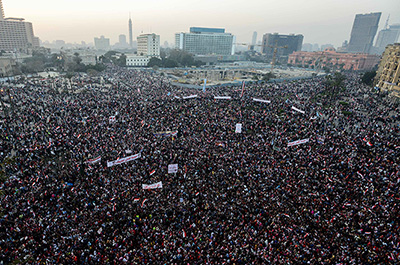New York, January 28, 2014–Several local and international journalists have been attacked and detained in Egypt while covering deadly clashes between police and supporters of ousted President Mohamed Morsi, according to news reports. The clashes erupted on Saturday, the third anniversary of the uprising in Egypt.
“None of the governments who have come to power in Egypt since the 2011 uprising have delivered on their promises to respect freedom of the press,” said Sherif Mansour, CPJ’s Middle East and North Africa Coordinator. “It is difficult to see how the country could achieve anything like democracy when it is one of the most dangerous places on earth for journalists to do their jobs.”
At least one journalist has remained in custody since Saturday. Karim el-Behiri, correspondent for the independent daily El-Badil, was arrested while covering protests in Cairo’s 6th of October neighborhood, according to news reports. A Cairo prosecutor accused him today of throwing Molotov cocktails at the police and ordered him to be imprisoned pending trial, El-Badil reported. Local journalists today released a statement on el-Behiri’s behalf, saying that the journalist had been working at the time of his arrest. They have organized a protest on Wednesday to call for his release.
At least 14 journalists were briefly detained since Saturday. Two photographers for Al-Anadol news agency–Mohamed Elshamy and Philip Kasura–were arrested today and held for six hours, according to a tweet by Elshamy’s brother, freelance photojournalist Mosa’ab Elshamy. The journalists were questioned about their press credentials and told to renew them, according to the regional press freedom group Arab Network for Human Rights.
News accounts reported that at least 12 local and international journalists were briefly detained on Saturday. They include Khaled Abdel Aziz, a correspondent for Egypt 25 TV; Eid Saied, correspondent for the daily Watani; Essam Fouad, correspondent for the news website Veto; El-Badil correspondents Ahmed al-Hosseiny and Khaled Kamel; Al-Masry al-Youm photographer Tariq Wagih; Xinhua News Agency photographer Amro Salah; Ahmed Foud, a correspondent for the news website Karmoz; Abdel Khalek Salah, correspondent for the news website Sada Elbalad; and Al Kaher Wal Nass TV crew members Ahmed al-Shimy, Nour Ibrahim, and Mohamed al-Gabbas. The journalists were all released in a matter of hours.
Several journalists were also wounded while covering the clashes on Saturday between police and protesters. Hossam Baker, a photographer for El-Badil, was shot with live bullets while covering protests in front of the Egyptian Journalists’ Syndicate in Cairo, according to news reports. Baker told Masrawy news website that he was shot in the stomach by Egyptian police who were firing bullets at the crowd. He underwent surgery for his wounds.
Mohamed Fawzy, photographer for Al-Wafd newspaper, was shot by live bullets while covering the clashes in Cairo’s Matareya neighborhood, according to news reports. The paper’s editor, Magdy Sarhan, said that unidentified assailants shot Fawzy in the jaw as he was standing near a police car. The journalist underwent surgery for his injuries.
Abdullah Abul Gheit, another photographer for El-Badil, was shot by rubber bullets fired by supporters of the Muslim Brotherhood, according to El-Badil, which posted a video of the attack on its YouTube channel. He was treated at a nearby hospital.
Al-Alam, an Iranian news channel in Cairo, said in a statement that two of its crew members were fired at with birdshot while covering protests in the Mohandesin neighborhood in Giza. Mahmoud Bayoumi, a cameraman, was shot in the arms and legs, and Ali Abdul Wahab, a sound technician, was hit in the head. Ahmed al-Seyoufy, an editor with Al-Alam, said that Bayoumi sought treatment for his injuries, but al-Seyoufy did not need to be hospitalized, according to Al-Alam.
On Saturday, at least four journalists–Samah Farag, correspondent for the news website Al-Bawaba Newsa; Wala Waheed, correspondent for the opposition daily Al-Wafd; correspondent for the English-language paper Daily News Bassel el-Daba; and freelancer Nadine Marroushi on assignment for the London Review of Books blog –were accused of working with the Qatar-based broadcaster Al-Jazeera and harassed and beaten by government supporters, according to news reports and local press freedom groups. They were not seriously wounded.
In a video published on YouTube on Saturday, a police officer can be heard telling a correspondent for MBC Misr TV satellite channel to stop filming police officers standing in front of a Muslim Brotherhood protest or he would announce they were part of an Al-Jazeera crew and let them be attacked.
Journalists working for Al-Jazeera and its affiliates have consistently been harassed by Egyptian authorities, and are seen by many Egyptians as being biased in favor of Morsi’s government. Al-Jazeera denies the allegations.
At least five Al-Jazeera journalists are in jail in Egypt. One of them, Abdullah Elshamy, began waging a hunger strike last week, according to the broadcaster. Another, Peter Greste, sent a letter from prison in which he said he spent most of his time in solitary confinement and called for more pressure to be exerted on the Egyptian government to release the journalists.
Egypt is among the top 10 jailers of journalists, according to CPJ’s annual census conducted on December 1. The country was the third deadliest for the press in 2013, CPJ research shows.
- For more information and analysis visit CPJ’s Egypt page here.
EDITOR’S NOTE: The 10th paragraph has been modified to correct the spellings of Nadine Marroushi’s name and the title of
Al-Wafd newspaper. It has also been corrected to reflect that Marroushi is a freelancer who was on assignment for the London Review of Books blog and not a correspondent for Daily News as previously stated.
